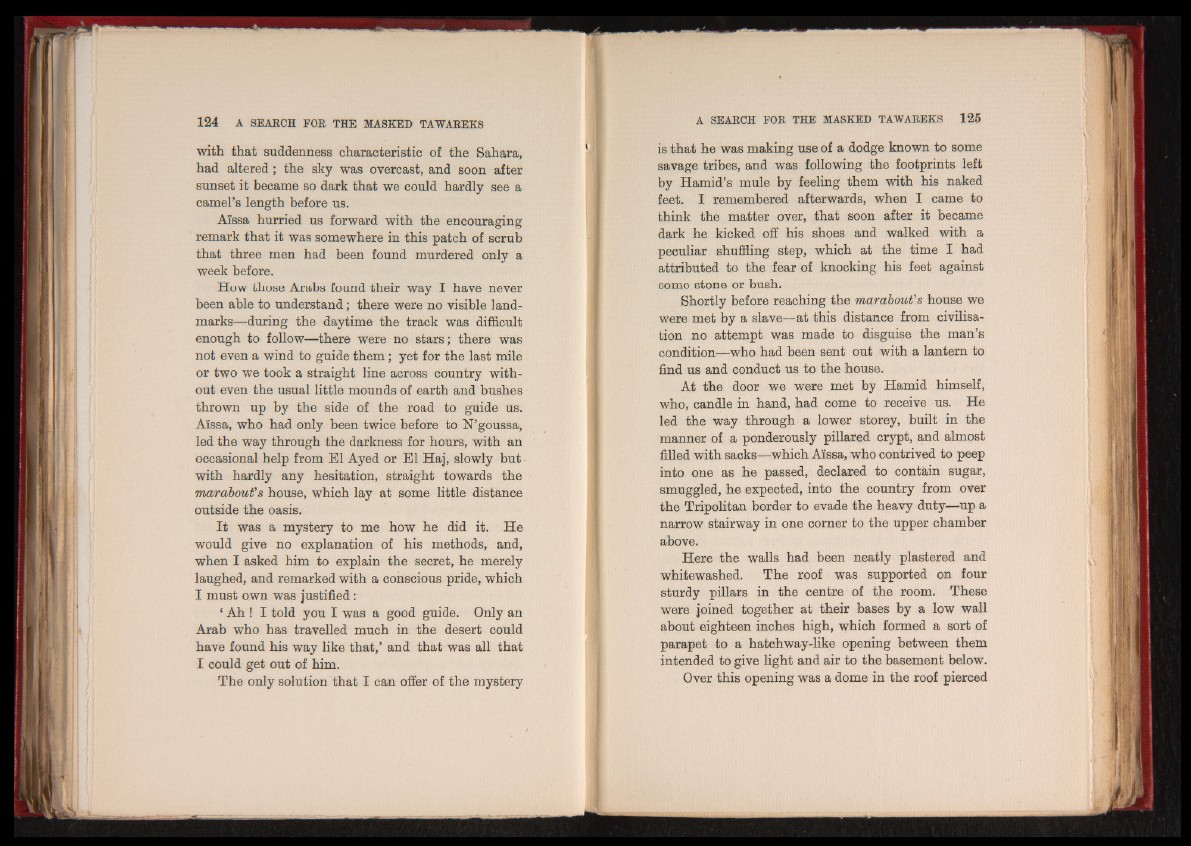
with that suddenness characteristic of the Sahara,
had altered; the sky was overcast, and soon after
sunset it became so dark that we could hardly see a
camel’s length before us.
Alssa hurried us forward with the encouraging
remark that it was somewhere in this patch of scrub
that three men had been found murdered only a
week before.
How those Arabs found their way I have never
been able to understand; there were no visible landmarks—
during the daytime the track was difficult
enough to follow—there were no stars; there was
not even a wind to guide them; yet for the last mile
or two we took a straight line across country without
even the usual little mounds of earth and bushes
thrown up by the side of the road to guide us.
Aissa, who had only been twice before to N’goussa,
led the way through the darkness for hours, with an
occasional help from El Ayed or El Haj, slowly but
with hardly any hesitation, straight towards the
marabout's house, which lay at some little distance
outside the oasis.
It was a mystery to me how he did it. He
would give no explanation of his methods, and,
when I asked him to explain the secret, he merely
laughed, and remarked with a conscious pride, which
I must own was justified:
‘ Ah ! I told you I was a good guide. Only an
Arab who has travelled much in the desert could
have found his way like that,’ and that was all that
I could get out of him.
The only solution that I can offer of the mystery
is that he was making use of a dodge known to some
savage tribes, and was following the footprints left
by Hamid’s mule by feeling them with his naked
feet. I remembered afterwards, when I came to
think the matter over, that soon after it became
dark he kicked off his shoes and walked with a
peculiar shuffling step, which at the time I had
attributed to the fear of knocking his feet against
some stone or bush.
Shortly before reaching the marabout’s house we
were met by a slave—at this distance from civilisation
no attempt was made to disguise the man’s
condition—who had been sent out with a lantern to
find us and conduct us to the house.
At the door we were met by Hamid himself,
who, candle in hand, had come to receive us. He
led the way through a lower storey, built in the
manner of a ponderously pillared crypt, and almost
filled with sacks—which A'issa, who contrived to peep
into one as he passed, declared to contain sugar,
smuggled, he expected, into the country from over
the Tripolitan border to evade the heavy duty—up a
narrow stairway in one corner to the upper chamber
above.
Here the walls had been neatly plastered and
whitewashed. The roof was supported on four
sturdy pillars in the centre of the room. These
were joined together at their bases by a low wall
about eighteen inches high, which formed a sort of
parapet to a hatchway-like opening between them
intended to give light and air to the basement below.
Over this opening was a dome in the roof pierced